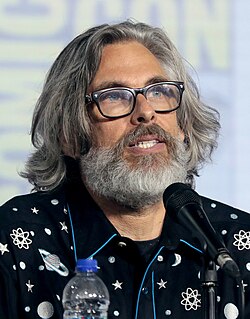Michael Chabon Quote
Approaching the Williamsburg Bridge - not really certain of how he had managed to find himself there - he experienced an extraordinary moment of buoyancy, of grace. There was a lot more traffic now, but his shifting was smooth and the sturdy little car was adroit at changing lanes. He launched himself out over the East River. He could feel the bridge humming underneath his wheels and all around him could sense the engineering of it, the forces and tensions and rivets that were all conspiring to keep him aloft. To the south, he glimpsed the Manhattan Bridge, with its Parisian air, refined, elegant, its skirts hiked to reveal tapered steel legs, and, beyond, the Brooklyn Bridge, like a great ropy strand of muscle. In the other direction lay the Queensboro Bridge, like two great iron tsarinas linking hands to dance. And before him, the city that had sheltered him and swallowed him and made him a modest fortune loomed, gray and brown, festooned with swags and boas of some misty gray stuff, a compound of harbor fog and spring dew and its own steamy exhalations. Hope had been his enemy, a frailty that he must at all costs master, for so long now that it was a moment before he was willing to concede that he had let it back into his heart.
Approaching the Williamsburg Bridge - not really certain of how he had managed to find himself there - he experienced an extraordinary moment of buoyancy, of grace. There was a lot more traffic now, but his shifting was smooth and the sturdy little car was adroit at changing lanes. He launched himself out over the East River. He could feel the bridge humming underneath his wheels and all around him could sense the engineering of it, the forces and tensions and rivets that were all conspiring to keep him aloft. To the south, he glimpsed the Manhattan Bridge, with its Parisian air, refined, elegant, its skirts hiked to reveal tapered steel legs, and, beyond, the Brooklyn Bridge, like a great ropy strand of muscle. In the other direction lay the Queensboro Bridge, like two great iron tsarinas linking hands to dance. And before him, the city that had sheltered him and swallowed him and made him a modest fortune loomed, gray and brown, festooned with swags and boas of some misty gray stuff, a compound of harbor fog and spring dew and its own steamy exhalations. Hope had been his enemy, a frailty that he must at all costs master, for so long now that it was a moment before he was willing to concede that he had let it back into his heart.
Related Quotes
About Michael Chabon
born May 24, 1963) is an American novelist, screenwriter, columnist, and short story writer. Born in Washington, D.C., he spent a year studying at Carnegie Mellon University before transferring to the University of Pittsburgh, graduating in 1984. He subsequently received a Master of Fine Arts in creative writing from the University of California, Irvine.
Chabon's first novel, The Mysteries of Pittsburgh (1988), was published when he was 24. He followed it with Wonder Boys (1995) and two short-story collections. In 2000, he published The Amazing Adventures of Kavalier & Clay, a novel that John Leonard would later call Chabon's magnum opus. It received the Pulitzer Prize for Fiction in 2001.
His novel The Yiddish Policemen's Union, an alternate history mystery novel, was published in 2007 and won the Hugo, Sidewise, Nebula and Ignotus awards; his serialized novel Gentlemen of the Road appeared in book form in the fall of the same year. In 2012, Chabon published Telegraph Avenue, billed as "a twenty-first century Middlemarch", concerning the tangled lives of two families in the San Francisco Bay Area in 2004. He followed Telegraph Avenue in November 2016 with his latest novel, Moonglow, a fictionalized memoir of his maternal grandfather, based on his deathbed confessions under the influence of powerful painkillers in Chabon's mother's California home in 1989.
Chabon's work is characterized by complex language, and the frequent use of metaphor along with recurring themes such as nostalgia, divorce, abandonment, fatherhood, and most notably issues of Jewish identity. He often includes gay, bisexual, and Jewish characters in his work. Since the late 1990s, he has written in increasingly diverse styles for varied outlets; he is a notable defender of the merits of genre fiction and plot-driven fiction, and, along with novels, has published screenplays, children's books, comics, and newspaper serials.
